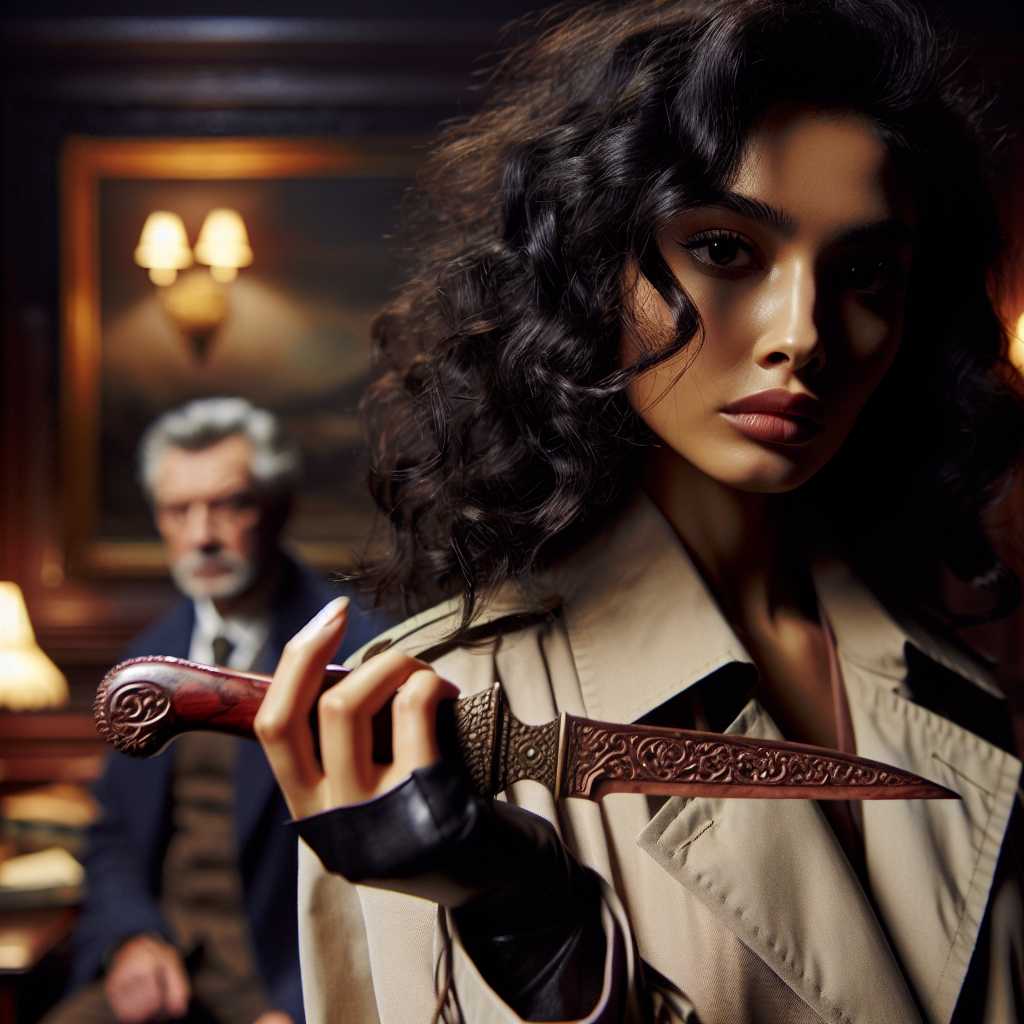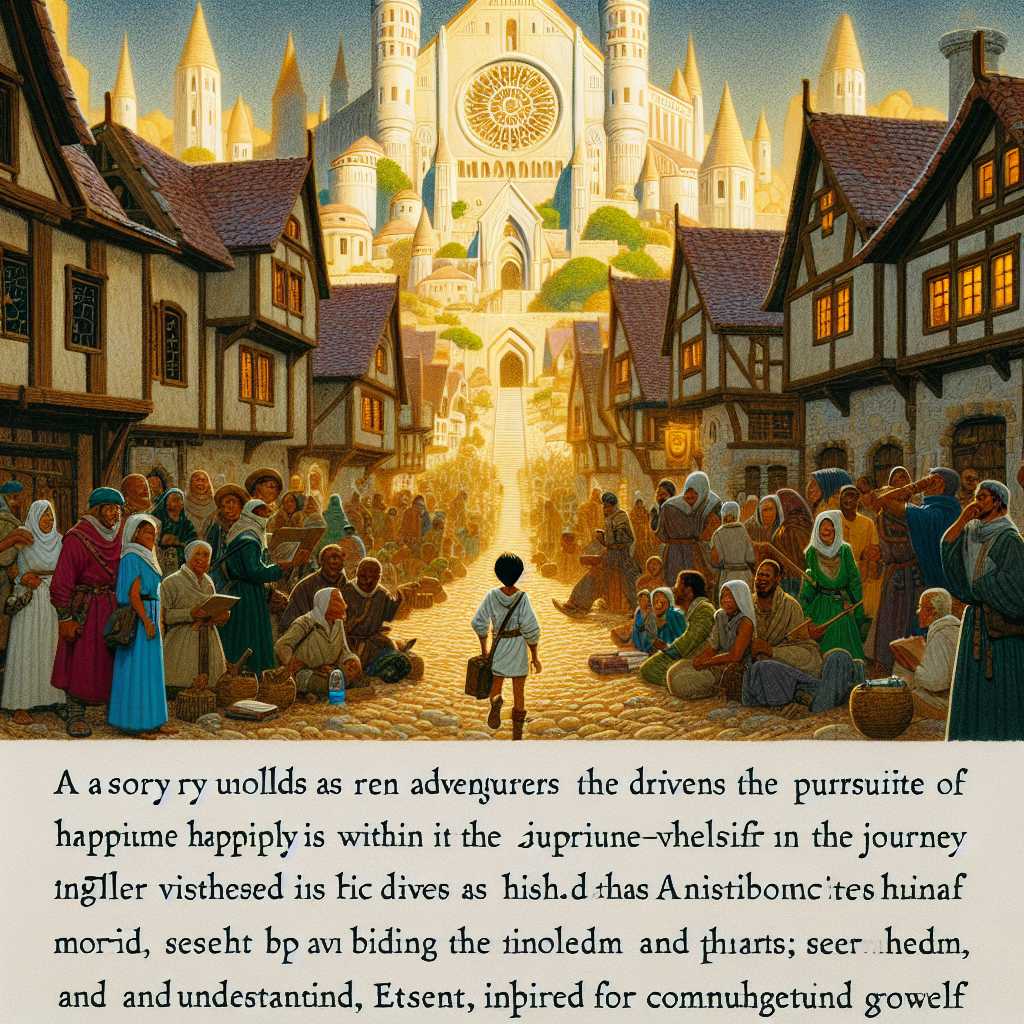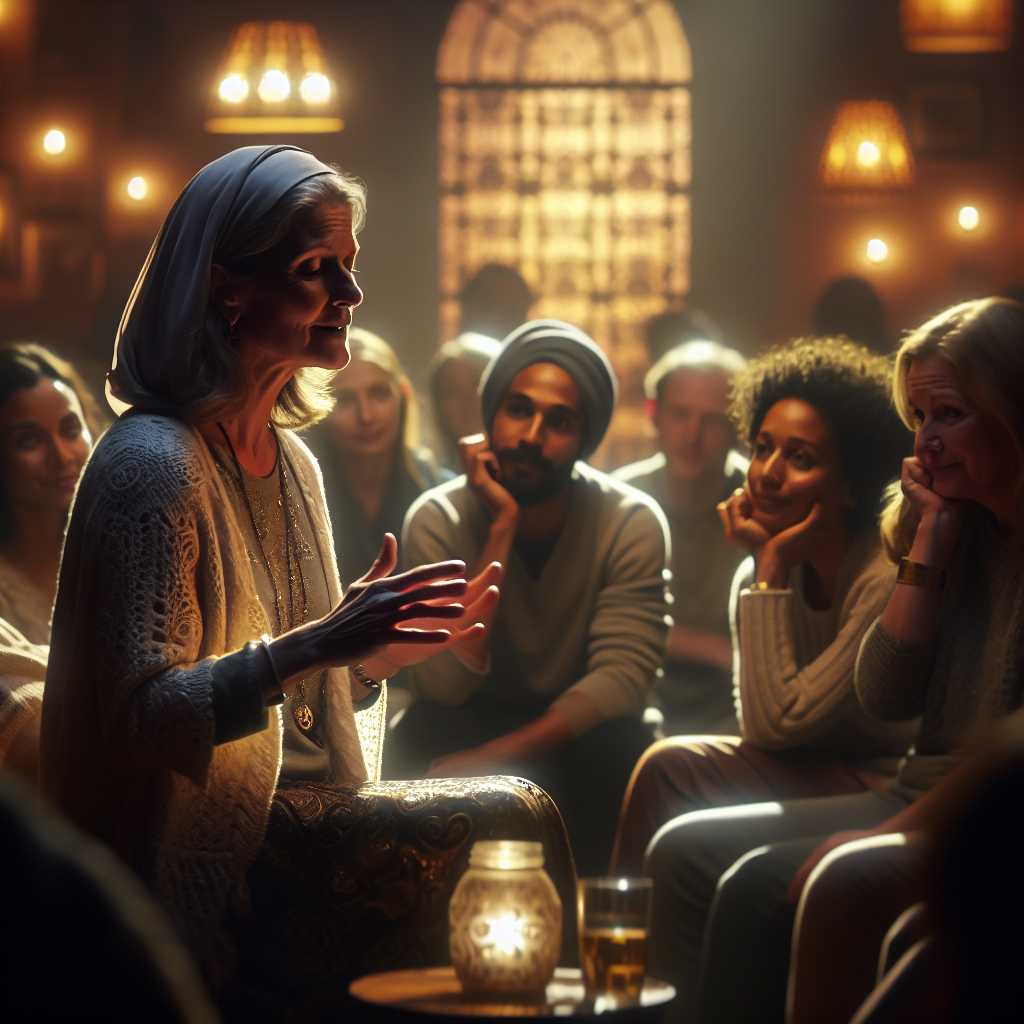
In the dimly lit streets of Chesterfield, where the fog hung thick like an enduring ghost, there lived a detective whose prowess was known far and wide. His name was Edmund Sinclair, a man whose keen mind and undeterred curiosity had solved the most perplexing mysteries of his time. On this particular evening, however, a new challenge awaited him—one that promised to test his abilities to their utmost limits.
It was a stormy night when Ms. Eliza Thornton came knocking at Edmund’s door, her eyes soaked with both rain and despair. She clutched a letter, every inch of her delicate frame trembling. As she entered, Edmund noticed a peculiar item tucked under her arm: a finely crafted dagger with a rose-wood hilt.
"Mr. Sinclair, thank you for seeing me at such short notice," she began, her voice barely more than a whisper.
"No thanks are necessary, Ms. Thornton. Now, tell me, what seems to trouble you?" Sinclair replied, gesturing for her to take a seat by the comforting glow of the fireplace.
She handed him the letter, which read:
Dear Eliza,
Your father was a man beset by secrets, many of which could shatter notions embedded within you. Be warned, as the truth you seek might not be the salvation you hope to find.
Regards,
A Friend
The letter was unsigned, save for the ambiguous initial F, and despite its cryptic nature, the message was clear to Eliza. Her father, the late Lord Thornton, had left unanswered riddles and broken promises that now lingered in the idle corners of her life.
"What is it about this letter that brings you here, Ms. Thornton?" asked Sinclair, his voice a blend of sympathy and intrigue.
Eliza hesitated, her eyes weary with recollections. "My father was a collector of artifacts, some rare and some, I fear, dangerous. This dagger," she said, lifting the rose-wood hilt for Sinclair to examine, "was always his most prized possession. I believe it to be connected to his secretive past."
Edmund took the dagger, weighing it carefully in his hands. Its craftsmanship was exquisite, yet ominous, the blade sharped to perfection. Carved into the wood were runes he recognized to be of ancient origin, hinting not just of age, but of a history intertwined with arcane events.
"This," said Sinclair, "is more than a mere weapon. It could be the key to unraveling the shadows upon your father's past." Without further delay, Sinclair agreed to take the case.
Over the following days, Edmund's investigation led him through the labyrinthine alleys of Chesterfield. He sought out old acquaintances of Lord Thornton, delving into archives and conducting interviews that revealed a man enmeshed in the occult—a network of rare antiquities and hushed societies.
Among the clues, a promising lead emerged: Lord Thornton had ties to an underground auction house said to be operating on the outskirts of the city. Rumors whispered about the place spoke of secretive dealings in treasures not meant for the eyes of the uninitiated. It was here that Sinclair sensed the potential for unearthing truths.
As darkness fell upon one such evening, Sinclair, cloaked in anonymity, attended the gathering. The auction house was disguised within an old theater, its presence hidden in plain sight. Attendees were masked strangers; their identities lost beneath veils of secrecy much like the artifacts they pursued.
Indeed, even through the clandestine haze, Sinclair recognized a tangible tension—an air thick with expectation. His insights borne from years of experience soon led him to a private room where significant transactions transpired. There, amid whispered negotiations, sat a journal. Its exterior portrayed ordinary bindings, but its contents were far from mundane.
Edmund made his move, acquiring this journal under the guise of a keen collector. Upon returning to his quarters, he found within its pages meticulously kept records of transactions that tied Lord Thornton to a clandestine trade of relics—each entry dated and annotated in the late lord's meticulous hand.
Yet, it was a single entry that chilled Sinclair. It spoke of an item—an Egyptian relic said to hold untold power. Beside it, a simple note read: "Destined for F." Now, Sinclair's eyes fell upon the mystery of "F," the initial left lingering in Eliza’s letter. Could this entity have been more than a mere friend?
Determined to confront the architect behind these secrets, Detective Sinclair finally pieced together the final elements: the dagger was a piece in a larger puzzle—a safeguard as much as it was a weapon. On the next fateful dawn, Sinclair beckoned Eliza to join him at a manor owned by a stately figure connected with her father’s dealings.
As they approached, they were met by Mr. Felix Moore—a name that bore the haunting "F." His countenance revealed nothing but courtesy, yet his knowledge of Sinclair’s investigation was apparent.
"Mr. Moore," began Sinclair, "it seems your relationship with Lord Thornton bound you both in shadows. I trust you know what I'm here for, given your own part in this dance with antiquity?"
"You're astute, Mr. Sinclair," replied Felix with a wry smile. "Thomas and I were partners of a kind—a mutual pursuit of the extraordinary. Though his fate led him further than we dared to tread."
It was revealed—avec diplomacy and an understanding reached—that the dagger and the artifacts within Thornton's collection held too much perilous influence. Their covenant was to ensure these artifacts remained veiled, to prevent chaos they might bring if let loose into unknowing hands.
Edmund Sinclair, his mind always questing for justice and understanding, pondered a while before seeing truth in Felix’s words. He returned the dagger to Eliza, who, with new understanding, decided to relegate her father’s legacies to a place of silence and rest.
Amidst the continued fog and the lights of Chesterfield, Sinclair soon found himself by his hearth once more—another mystery untangled, and new wisdom subdued into the stories he would someday retell.










